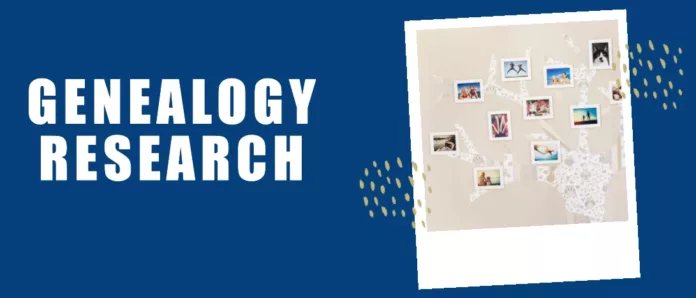What is Genealogy?
Genealogy is the study and tracing of family history and lineage. It involves the investigation of one’s ancestors, their relationships, and the historical context in which they lived. Genealogy aims to create a comprehensive family tree, documenting the names, dates, and places associated with each individual in the family’s past.
Key elements of genealogy
Research and Documentation
Genealogists gather information from various sources, such as birth and death certificates, marriage records, census data, wills, military records, and oral histories. They meticulously document their findings to create a reliable and accurate family tree.
Primary and Secondary Sources
Primary sources are original documents or records, like birth or marriage certificates, created during an event. Secondary sources are records created after an event and may rely on information from primary sources. Both types of sources are crucial in genealogical research.
Online Databases and Archives
In the digital age, many resources for research are available online. Websites and databases provide access to a wide range of records, making it easier for experts and enthusiasts to conduct research anywhere in the world.
DNA Testing
DNA testing has become a powerful tool in genealogy. It allows individuals to discover their genetic ancestry, find relatives, and confirm or expand upon their documented family tree. Companies like AncestryDNA, 23andMe, and MyHeritage offer these services.
| Preview | Product | Price | |
|---|---|---|---|

|
AncestryDNA Genetic Test Kit: Personalized Genetic Results, DNA Ethnicity Test, Origins &… |
$59.00 |
Buy on Amazon |
Software and Tools
Software helps organize and store family tree information. These programs allow users to input and track data, generate reports, and visualize family relationships.
Cultural and Historical Context
Understanding the historical and cultural context of a family’s past is crucial. It helps genealogists interpret records, gain insights into their ancestors’ lives, and appreciate how societal changes may have influenced their family’s history.
Preservation and Sharing
Genealogists may work to preserve family records, photographs, and artifacts. They often create family histories or compile their research into books or digital formats to share with relatives and future generations.
Genealogy is a rewarding pursuit that allows individuals to explore their heritage, learn about their ancestors, and gain a broader historical perspective. It can foster a sense of belonging and provide a unique window into the past. Private investigators sometimes become involved in researching people’s roots due to their access to various information sources and keen ability to dig up information. Private investigators use various research tools, many of which are described below.
Genealogy Software and Online Services
Genealogy software helps you uncover and compile research to build your family tree. Many ancestry software programs allow you to gather family photos, create charts, and even create books to share with family. Private investigators are often asked to conduct lineage research due to their skill in gathering facts and information. Leverage a suitable software program or an online search tool to help.
- Works on Windows 11, 10, & 8
- New Features! New Descendants View, Print background images on charts, improved syncing with FamilySearch Family Tree
- FREE! Access to over 14 billion historical records, photos, news stories, and documents. Available in English, French, Spanish, and German
- TreeTips- Innovative technology built into Family Tree Heritage displays hints for possible records about your ancestors
Other Software
- RootsMagic Family Tree Genealogy Software – An easy-to-use family tree program with extensive family history reports, multiple navigation views, photos, publishing, and website creation features. The program supports an unlimited number of people, families, events, notes, and photos. Use the tool to print books, charts, forms, lists, and custom reports.
- Personal Historian Software – This helpful program helps you write a personal history, memoir, and biography about yourself or your family members. It helps keep you organized by breaking your writing into small pieces and compiling the information into a complete document.
- Master Genealogist Silver Edition – This helpful tool guides you through managing your family history project. Includes features such as charts, forms, notes, and bibliographies. It also includes a historical timeline feature and a to-do list to help keep you organized. In addition, the software includes a tutorial on how to conduct research.
- Generations Family Tree Software Program – An excellent tool for researching your family history and building a family tree.
Genealogy Books
Learn How to use Genealogy Research Tools to Find your Family Roots and History
Investigators use various resources to trace a family’s history, including online database research, search engines, genealogical websites, court record searches, newspapers, and libraries. In some cases, PIs can help coordinate DNA testing and provide assistance with interpreting the results.
Understanding how to conduct research can be learned via training courses or self-taught using books related to the subject. Amazon.com has various books on the subject and can be an excellent resource for novice and experienced detectives.
Following is a small sample of several books that provide helpful tips on researching ancestors and building a family tree.
- Trace Your Roots with DNA: Use Your DNA to Complete Your Family Tree – This helpful book explains how genetic testing can help you research your ancestry, the types of DNA testing available, how to interpret the results, and more.
- Genealogy 101: How to Trace Your Family’s History and Heritage – This guide explains the basic steps to find your ancestors, look for information in libraries, leverage historical societies, and an extensive review of internet sources.
- Online Roots: How to Discover Your Family’s History and Heritage With the Power of the Internet – This book covers how to use the power of the Internet to find research information, evaluate the results, and use the information to trace your family’s history.
- Your Guide to Cemetery Research – A book that explains how to conduct cemetery and graveyard research. How to capture information from tombstones, burial customs, etc.
- Unpuzzling Your Past: The Best-Selling Basic Guide to Genealogy – Learn how to gather sources, the meaning of names, whom to interview, and more in this basic guide to genealogy.
- The Organized Family Historian: How to File, Manage, and Protect Your Genealogical Research and Heirlooms
- Finding Your Roots Online – How to use the Internet to find your roots. Explains how to find information online and how to analyze the results.
Obituaries
Find information about deceased individuals by searching obituaries, cemeteries, and vital records.
An obituary is a notice of the death of a person, usually published in a newspaper, written or commissioned by the newspaper, and usually includes a short biography that describes a person’s history, family, and meaningful life events. It is similar to a funeral notice, which is also on the obituary page. Also, obituaries are sometimes known as “obits.” A funeral notice is a paid advertisement written by family members and placed in the newspaper by the funeral home. The following are links to websites with obituary listings, archives, and records.
- Find a Grave – Search millions of grave records.
- Interment – Interment.net contains thousands of transcriptions of cemetery records and tombstone inscriptions from cemeteries in the USA, Canada, England, Ireland, Australia, and New Zealand. It also includes lists of specialized burial locations for people who died in mining disasters, shipwrecks, airship disasters, train wrecks, and more. It is one of the largest and best search sites on the web.
- Legacy.com – A nationwide resource for obituaries. It contains many individual listings from celebrities and other famous deaths. Search obituaries by the newspaper.
- Newspaper Obituaries – ObituariesHelp.org – Access newspaper death notices and discover your heritage online. Discover obituary resources like old newspaper obituaries archives and Download free request forms and printable family tree charts. Includes articles that provide advice on writing sympathy cards, eulogies, condolences, and more.
Biography Research Tools
Biography is a genre of literature and other forms of media, like film, based on the written accounts of individual lives. While a biography may focus on a subject of fiction or non-fiction, the term is usually about non-fiction. Unlike a profile or curriculum vitae, a biography develops complex insight and highlights different textures of personality, including intimate details of experiences.
A biography is more than a list of impersonal facts like birth, education, work, relationships, and death. It also delves into the emotions of experiencing such events. The following are resources for finding biographical information on individuals.
- Biographical Dictionary – S9.com is a Wikipedia-type system; everyone can edit biographies or create their own. S9.com is now one of the most extensive biography sites.
- Biography Online Database – More than 20,000 people from the Cambridge Encyclopedia Database and the Cambridge Dictionary of American Biography
Additional Tools
Following are various resources and resources for researching your family history:
- Ellis Island Records – The Statue of Liberty Ellis Island Foundation website. Nearly half of all Americans can trace their family history to at least one person who passed through the Port of New York at Ellis Island. The Ellis Island website provides information on the history of Ellis Island, the Ellis Island Immigrant Experience, and information on visiting the island. The website also provides the ability to search Ellis Island records, passenger records, and archives.
- FamilySearch Internet Genealogy Service – FamilySearch is the largest resource of its kind. Millions of people use FamilySearch records, resources, and services to learn more about their family history. For over 100 years, FamilySearch has been actively gathering, preserving, and sharing genealogical records worldwide. Patrons may access our resources and services online at FamilySearch.org or through over 4,500 family history centers in 70 countries, including the renowned Family History Library in Salt Lake City, Utah.
- Genealogy.com – Offers a wide range of family and local histories, vital records, death records, military records, discovery tools, and more.
- GeneaNet – Helpful roots information that helps you build Your Online Family Tree, Share Your Family History, and Improve Your Research.
- Intelius – Provides people with search reports, background checks, criminal records, court records, real estate, and financial reports.
- National Archives – How to research records in the U.S. National Archives.
- Resources By State (USA.gov) – This website lists each state’s helpful research tools and resources.
- USGenWeb Project – The USGenWeb Project consists of a group of volunteers working together to provide Internet websites for genealogical research in every county and every state of the United States. The Project is non-commercial and provides free access for everyone. The organization is by county and state, and this website provides links to all the state websites, which, in turn, provide gateways to the counties.
Questions and Comments
Please comment below if you have any questions about these genealogy research tools.





Hi! If a PI is trying to see if a young child died in 1980-1985, but she only knows the child’s name and city/county in California she may have died, and doesn’t have authorized permission from the victim’s family or a govt agency, what’s her best course of action for checking to see if there is a death record? Is one allowed to use Ancestry . com or the like? And what explanation might there be for no death record/index if the victim died? Thank you :)
I’m an author and in my current book my PI has a person’s social security number and wants to look up her genealogy using her SS#. In my research of the genealogy web sites, non of them search by SS#. Do PI’s use these search engines and follow the same procedure as a non-PI or do they have a special software program that allows them to search using a SS#?
Thank you,
CH Taxdal
To search by social security number, private investigators would need access to a background check information provider such as Accurint, LexisNexis, KnowX, etc. See our Background checks page.
Also, some private detectives are approved to access credit reporting information for business purposes (e.g. background checks, employment checks, debt collections, etc.), which may be searched by SSN.